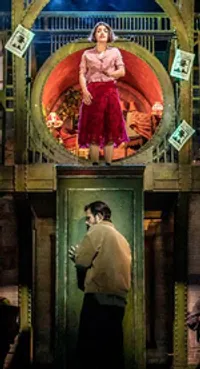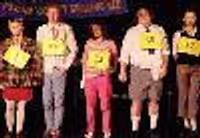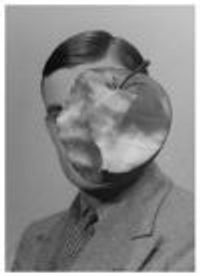RAGTIME is a good, flawed show **Spoilers**
TheEnchantedHunter
Broadway Legend Joined: 6/27/05
#25re: RAGTIME is a good, flawed show **Spoilers**
Posted: 11/3/09 at 1:27am
'Flawed' is an understatement:
Why does Coalhouse, purportedly a musician, but by mid-Act One a guy who seems to care more about his car than anything else, send his girlfriend and child into the woods alone for "safety" but then leaves the car with ruffians while he goes to look for a cop, who was probably going to be both white AND Irish?
Wouldn't he have been able to find the unhelpful police officer faster if he had been driving? Weren't Sarah and the baby safer in the car? Wasn't the car safer with all of them in it, rather then abandoned to the clearly bigoted ruffians (did Coalhouse think they were going to polish it for him)? Was he born under a rock? Or are his actions written to suit the writers' un-thought-through whims?
Are we really supposed to have sympathy for Sarah, who thinks she can approach the POTUS waving her arms like a madwoman (even if the rest of her behavior, i.e. burying live infants, clearly indicates that she is)? This character was too stoopid to live!
And how did 5 black guys and one white one get into the Morgan Library? I can believe that a bunch of anonymous Middle-Eastern guys bought tickets on separate airlines, took them over and flew them into buildings, but I cannot believe that a black man, who is wanted in several states for killing firemen, somehow got into a famous public building and wired it with explosives.
I also can't deal with the Younger Brother character. He is first portrayed as sort of an aimless joke, getting his rocks off fantasizing over a brainless, opportunistic bimbo like Evelyn Nesbitt. Suddenly he's a revolutionary? Why? Is he now horny for Emma Goldman?
And what is the point of Father being chosen to be a hostage negotiator? This is a guy who runs a fireworks company and has a fantasy of being a gentleman explorer and lives in the suburbs. Why didn't they call me to negotiate the hostage situation? At least I live in the city! And then he gets there and discovers that his idiot brother-in-law is part of the gang! Quel surprise! Considering there are only 10 people in America, I'm surprised his father-in-law wasn't there as well!
And why does he switch clothes with Younger Brother? What's the point? All the gang members leave, he leaves, only Coalhouse gets killed. So why make that exchange? Just to have a moment? A moment without any point and therefore without any resonance is just BS.
Why were Evelyn Nesbitt and Houdini even there at all? At least Ford made the car that Coalhouse was willing to die for, and Morgan built the building that Coalhouse was going to blow up to get revenge for his car, and Goldman was there to tempt Younger Brother away from bimbos and into anarchy, and Booker was there to tell Coalhouse to be an accommodating black man--- but what did Nesbitt and Houdini have to do with ANYTHING, except maybe not being smart enough to prevent WWI?
And the wonderment continues:
Am I really supposed to believe that this little kid in New Rochelle predicted the assassination that started WWI? What is the point of this 'metaphor' if it doesn't work on the most fundamental level of reality? If only Houdini had picked up the hint the first dozen or so times the kid happened to by miraculous coincidence cross his path, WWI could have been averted, millions of lives saved, happy ending--
but Houdini just didn't get it! And guess what? Neither does the audience!!!
And of course Father goes down on the Lusitania, thereby sparing his wife, who had enough courage and spunk to raise the child of a black song writer/anarchist and marry an immigrant Jew, but apparently not the guts to divorce her husband in the first place because that would have been unseemly.
Which ultimately proves that, what works on the page doesn't necessarily work (or even make sense) on the stage.
Updated On: 11/3/09 at 01:27 AM
#26re: RAGTIME is a good, flawed show **Spoilers**
Posted: 11/3/09 at 1:31am...wow.
#27re: RAGTIME is a good, flawed show **Spoilers**
Posted: 11/3/09 at 2:33am
^^^
I'm not familiar with this musical, but is that really the story in a nutshell? I must say, it sounds too contrived.
Vita, dulcedo, et spes nostra
Salve, Salve Regina
Ad te clamamus exsules filii Eva
Ad te suspiramus, gementes et flentes
O clemens O pia
#28re: RAGTIME is a good, flawed show **Spoilers**
Posted: 11/3/09 at 3:16am
I'm one of those who hasn't seen the show, but has only listened to the cast recording, and that awhile ago now. I do remember being disappointed by how Tateh's character developed (or failed to develop). Feel free to fill in the blanks if my memory of his subplot has become distorted.
The other Ragtime characters that we're meant to care about come to realisations about seeing the bigger picture, and learn to self-sacrifice for the good of others. Tateh experiences the hardshp of unemployment and poverty along with thousands of others. He then gets lucky with his flip-book and gets rich. But there's no indication that he does anything to help other poor/unemployed people - he simply channels his wealth into making his own daughter feel like a princess. He seems like a nice person, and his bravery, hard work, intelligence and acceptance of other cultures and races etc is appealing. But the other characters are given much more personal growth and selflessness, and are therefore more likeable.
The 'message' of his subplot is irritating too. He comes hopefully to the land of opportunity, then comes to hate it when he sees the reality, then the American Dream is vindicated because he happens to get lucky? All the other poor people beside him just weren't creative or entrepreneurial enough?
#29re: RAGTIME is a good, flawed show **Spoilers**
Posted: 11/3/09 at 8:09am
Jesus Christ.
This has got to be one of the more asinine threads on the board in a while. And that's really saying something.
Updated On: 11/3/09 at 08:09 AM
#30re: RAGTIME is a good, flawed show **Spoilers**
Posted: 11/3/09 at 8:20am
I am going to try to explain as succinctly as possible why I vehemently disagree with those pointing to holes in the plot.
This show isn’t a soap opera. It does not exist for you to involved in Sarah’s life and weep for her because you’ll miss her. This show isn’t about one man’s journey from silhouette artists to movie director. It’s not about the psychology of a woman finding a baby.
No, in fact, this story is about you. It’s about how you came to be here. Why you believe the things you do. Why you enjoy the freedoms you do every day. It’s about the steps a civilization must go through to change. The characters remain nameless in this show for a reason. They are an archetypal American family you are trying to blend into the crowd. On the other hand, Sarah and Coalhouse represent those that can’t fit in - whether it is only because of the color of their skin or because they really don’t want to and believe in some sense of individuality.
Younger Brother’s change from horny young man to revolutionary is the coming of age story of many generations. Tateh’s wealth represents the dreams and desires for many of the people that immigrated to this country. I don’t think many of them would care to have become social activists. They left their country for the promise that they could pull themselves up by their bootstraps and do well for their family. Sarah’s death represents a cry for help that isn’t being ignored. Her plea is viewed as threatening. Just as many people viewed blacks who were speaking up at that time - just as some ignorant people are threatened still today by an African American president.
When I cried during “Til We Reach That Day,” it was not over Sarah. It was over the sentiment that the quest for freedom and equality is a struggle with no end in site. Yet it’s something we still strive for nonetheless.
It’s what this play is about, what this country is about, and it’s the reason you’re able to afford a ticket to this Broadway show after your relatives struggled to feed themselves only 100 years ago.
Maybe this show isn’t perfect, but I’m not sure some of you are correctly reading its intentions. This is a show that’s asking you to look inward to yourself, and outward to society – not just at what’s on the stage. And for me, it does that tremendously well.
#31re: RAGTIME is a good, flawed show **Spoilers**
Posted: 11/3/09 at 8:46am
"The 'message' of his subplot is irritating too. He comes hopefully to the land of opportunity, then comes to hate it when he sees the reality, then the American Dream is vindicated because he happens to get lucky?"
This is a huge problem for me, too, that I neglected to mention. Another attempt to put a "hopeful" spin on inherently cynical source material.
"This has got to be one of the more assanine threads on the board in a while. And that's really saying something."
Well, it's "asinine," not "assanine," but why exactly? Because people on here disagree with you?
"Maybe this show isn’t perfect, but I’m not sure some of you are correctly reading its intentions. This is a show that’s asking you to look inward to yourself, and outward to society – not just at what’s on the stage. And for me, it does that tremendously well. "
I'm guessing (or at least, hoping) that you're somewhat involved in this production? Because if anything, it seems like you're talking about the source material and how the musical muddles its intentions. Yes, the characters were nameless in the book to be representative of archetypes -- but in this musical, we're not meant to be crying just because of symbolism and what the characters represent. Did you SEE the show? Its a completely sentimental, supposedly character-driven piece that attempts to wring emotion out of the story and characters.
#32re: RAGTIME is a good, flawed show **Spoilers**
Posted: 11/3/09 at 9:14am
I am in no way involved in this or any other theatrical production, being a civil engineer.
And I have seen this production, the Paper Mill production, and the original broadway production 1 time each.
And I'm not sure how you can say that it is void of emotion, and then say it's trying to wring emotion from these characters' stories. There are no major scenes that I can think of that do not have some sort of greater societal undercurrent. Unfortunately, I don't have the time to analyze every word of the show.
#33re: RAGTIME is a good, flawed show **Spoilers**
Posted: 11/3/09 at 9:28am
"The 'message' of his subplot is irritating too. He comes hopefully to the land of opportunity, then comes to hate it when he sees the reality, then the American Dream is vindicated because he happens to get lucky?"
This is a huge problem for me, too, that I neglected to mention. Another attempt to put a "hopeful" spin on inherently cynical source material."
Except that same progression also happens in the source material. True, the musical omits a great deal of what happens to Tateh in the Lower East Side (notably Evelyn Nesbit's participation in that subplot), but the character's progression is no different. He goes from disillusioned immigrant to successful filmmaker.
Alicia3
Swing Joined: 11/3/09
#34re: RAGTIME is a good, flawed show **Spoilers**
Posted: 11/3/09 at 10:48am
I personally can't wait to see this show and with the exception of a few people on here the word of mouth seems very good. What I don't understand is why TheEnchantedHunter who obviously doesn't like anything and seems very bitter in all his or her posts would spend so much time writing about a show he doesn't like.
I'm curious TheEnchantedHunter, what shows do you actually think are good so we have a point of view of your taste. But to spend so much time writing about a show you have no interest in, leaves me to believe that you are working for another show.
I don't mind someone not being a fan of a show but I think it's also insulting to be told what a sap you are if you happen to like something other don't. We all like different things.....that's what makes theater so great, we all don't have to like the same things.
#35re: RAGTIME is a good, flawed show **Spoilers**
Posted: 11/3/09 at 10:49am
"And I'm not sure how you can say that it is void of emotion, and then say it's trying to wring emotion from these characters' stories."
Because it heaps sentiment and emotional import upon these events, but the resonance never really comes because we're given no reason to really be invested or care other than we're being told to.
After Eight
Broadway Legend Joined: 6/5/09
#36re: RAGTIME is a good, flawed show **Spoilers**
Posted: 11/3/09 at 11:47am
I don't find this thread to be at all "asinine." In fact, it's one of the better ones I've read here.
Both Miracle Elxir and The Enchanted Hunter are articulate posters, and make very good points.
#37re: RAGTIME is a good, flawed show **Spoilers**
Posted: 11/3/09 at 12:02pmAdamGreer is just biased (hence his av). He takes offense whenever someone *dares* to criticize his favorite shows. Just check out any past N2N-related threads, and he was as defensive toward critics then, too.
Vita, dulcedo, et spes nostra
Salve, Salve Regina
Ad te clamamus exsules filii Eva
Ad te suspiramus, gementes et flentes
O clemens O pia
#38re: RAGTIME is a good, flawed show **Spoilers**
Posted: 11/3/09 at 12:14pm
AdamGreer is just biased (hence his av). He takes offense whenever someone *dares* to criticize his favorite shows. Just check out any past N2N-related threads, and he was as defensive toward critics then, too
HA. As the various people on the board that know me personally will attest to, I could not care less what other people think about a show I like or dislike. I have never in my life EVER worried about anyone else's opinion.
Updated On: 11/3/09 at 12:14 PM
Jon
Broadway Legend Joined: 2/20/04
#39re: RAGTIME is a good, flawed show **Spoilers**
Posted: 11/3/09 at 12:30pm
Why are Houdini and Evelyn in the show???? You are really asking that???
All the "real" people in the show are symbols. Houdini is the symbol of the European Jewish immigrant, ESCAPING from tyranny and becoming successful in America.
Evelyn symboloizes America's obsession with celebrity - she is the original tabloid princess - Paris Hilton, Lindsay Lohan, Kim Kardashian all rolled into one.
Henry Ford symbolizes the industrial revolution. Emma Goldman symbolizes the Socialist movement. Booker T. Washington symbolizes the early civil rights movement.
#40re: RAGTIME is a good, flawed show **Spoilers**
Posted: 11/3/09 at 1:02pm
Thankfully kidmanboy understands metaphor.
Ragtime is a masterpiece because it manages to combine an ambitious metaphoric scope without severing personal human emotions. When I see Ragtime I don't necessarily believe that the woman I see marry Tateh in Act II is the same woman I see find Sarah's baby in Act I: the genius is that it feels like she is.
Ragtime could also be criticised because the way the characters age doesn't necessarily reflect the timespan of the show. But again it doesn't matter because the whole show is a metaphor, including the named and nameless characters. The brilliance of the interwoven book, music and lyrics is that they have the emotional impact of real people.
"Well, aren't we the elitist?"
No. I'm an intelligent theatregoer and I don't see why I should have to apologise for the fact. I have just as much right to address your points as you have to post them.
After Eight
Broadway Legend Joined: 6/5/09
#41re: RAGTIME is a good, flawed show **Spoilers**
Posted: 11/3/09 at 1:24pm
"But again it doesn't matter, because the whole show is a metaphor."
It doesn't matter to you perhaps, but apparently, to others it does.
"The brilliance of the interwoven book, music and lyrics is that they have the emotional impact of real people."
It seems that some people did not experience this impact.
It's fine and dandy to say from on high that it's all a metaphor, and thereby dismiss all criticism. If a metaphor it is, then that metaphor still has to work in theatrical terms, and not bore an audience out of its gourd.
#42re: RAGTIME is a good, flawed show **Spoilers**
Posted: 11/3/09 at 1:38pm
""Well, aren't we the elitist?"
No. I'm an intelligent theatregoer and I don't see why I should have to apologise for the fact. I have just as much right to address your points as you have to post them."
Um, no, I called you an elitist (and yeah, you are) because you act as if those who have issues with the show merely don't get it.
I'm an intelligent theatregoer as well, and fully understand the intended metaphor(s) in "Ragtime." But as After Eight said, it has to work in theatrical terms as well, unless the piece is an entirely intellectual/academic exercise, which "Ragtime" is clearly not going for.
You can't dismiss any and all criticism by dubbing yourself intelligent, and declaring anyone who disagrees as ignorant.
SporkGoddess
Broadway Legend Joined: 7/27/05
#43re: RAGTIME is a good, flawed show **Spoilers**
Posted: 11/3/09 at 2:47pm
Haha, this is so nitpicky. So allow a fellow nitpicker to try to solve these problems.
"Why does Coalhouse, purportedly a musician, but by mid-Act One a guy who seems to care more about his car than anything else, send his girlfriend and child into the woods alone for "safety" but then leaves the car with ruffians while he goes to look for a cop, who was probably going to be both white AND Irish?"
Coalhouse is shown to be naive, I think. He believes that he will get justice because justice is due to him.
"Wouldn't he have been able to find the unhelpful police officer faster if he had been driving? Weren't Sarah and the baby safer in the car? Wasn't the car safer with all of them in it, rather then abandoned to the clearly bigoted ruffians (did Coalhouse think they were going to polish it for him)? Was he born under a rock? Or are his actions written to suit the writers' un-thought-through whims?"
Maybe he was't thinking clearly because he was so distressed.
"Are we really supposed to have sympathy for Sarah, who thinks she can approach the POTUS waving her arms like a madwoman (even if the rest of her behavior, i.e. burying live infants, clearly indicates that she is)? This character was too stoopid to live!"
Again, at the time it wasn't so weird. Sarah is also not shown to be very, like you said, rational.
"And how did 5 black guys and one white one get into the Morgan Library? I can believe that a bunch of anonymous Middle-Eastern guys bought tickets on separate airlines, took them over and flew them into buildings, but I cannot believe that a black man, who is wanted in several states for killing firemen, somehow got into a famous public building and wired it with explosives."
Can't explain this one, but Ragtime's not the first musical to have some implausible plot device like this.
"I also can't deal with the Younger Brother character. He is first portrayed as sort of an aimless joke, getting his rocks off fantasizing over a brainless, opportunistic bimbo like Evelyn Nesbitt. Suddenly he's a revolutionary? Why? Is he now horny for Emma Goldman? "
The idea is that Younger Brother was this very passionate person who had no outlet for it. He was channeling this passion into Evelyn, which was pretty useless and a waste of his time. When he discovered Goldman's causes, he realized what he had been looking for.
"And what is the point of Father being chosen to be a hostage negotiator? This is a guy who runs a fireworks company and has a fantasy of being a gentleman explorer and lives in the suburbs. Why didn't they call me to negotiate the hostage situation? At least I live in the city! And then he gets there and discovers that his idiot brother-in-law is part of the gang! Quel surprise! Considering there are only 10 people in America, I'm surprised his father-in-law wasn't there as well!"
I thought it was because Father knew Coalhouse. It's kind of like how you call in the person's family to try to negotiate.
"And why does he switch clothes with Younger Brother? What's the point? All the gang members leave, he leaves, only Coalhouse gets killed. So why make that exchange? Just to have a moment? A moment without any point and therefore without any resonance is just BS."
Dunno.
"Why were Evelyn Nesbitt and Houdini even there at all? At least Ford made the car that Coalhouse was willing to die for, and Morgan built the building that Coalhouse was going to blow up to get revenge for his car, and Goldman was there to tempt Younger Brother away from bimbos and into anarchy, and Booker was there to tell Coalhouse to be an accommodating black man--- but what did Nesbitt and Houdini have to do with ANYTHING, except maybe not being smart enough to prevent WWI?"
As someone else said, symbolism for the various changes and causes at the time.
And the wonderment continues:
"Am I really supposed to believe that this little kid in New Rochelle predicted the assassination that started WWI? What is the point of this 'metaphor' if it doesn't work on the most fundamental level of reality? If only Houdini had picked up the hint the first dozen or so times the kid happened to by miraculous coincidence cross his path, WWI could have been averted, millions of lives saved, happy ending--
but Houdini just didn't get it! And guess what? Neither does the audience!!!"
I think it's silly, too, but it's not enough to ruin the show for me.
"And of course Father goes down on the Lusitania, thereby sparing his wife, who had enough courage and spunk to raise the child of a black song writer/anarchist and marry an immigrant Jew, but apparently not the guts to divorce her husband in the first place because that would have been unseemly."
Not just unseemly. She would have lost likely her child, her financial stability, etc.
#44re: RAGTIME is a good, flawed show **Spoilers**
Posted: 11/3/09 at 3:01pmFor what it's worth, isn't the little boy (Edgar) supposed to be Edgar Cayce? Which is why he'd be saying, "warn the Duke".
Unknown User
Joined: 12/31/69
#45re: RAGTIME is a good, flawed show **Spoilers**
Posted: 11/3/09 at 3:05pmInteresting idea Dottie, but Cayce would have been 30-something at the time.
Unknown User
Joined: 12/31/69
#46re: RAGTIME is a good, flawed show **Spoilers**
Posted: 11/3/09 at 3:09pmAnd now that I think about Into the Woods, I don't think there really ARE magic beans!
#47re: RAGTIME is a good, flawed show **Spoilers**
Posted: 11/3/09 at 3:12pmThere are magic beans in "Ragtime" ? Who eats them? And why? Fill me in on all!!!!!
#48re: RAGTIME is a good, flawed show **Spoilers**
Posted: 11/3/09 at 3:19pmJoe, I just googled Edgar Cayce and see he was born in 1877. When seeing the show for the first time, I just came to that conclusion that the Little Boy was based on him.
RagtimeRay
Stand-by Joined: 5/16/03
#49re: RAGTIME is a good, flawed show **Spoilers**
Posted: 11/3/09 at 3:32pmThe creators of the musical gave the Little Boy the name of "Edgar" as a tribute to Edgar L. Doctorow, author of the source material for Ragtime.
Videos








